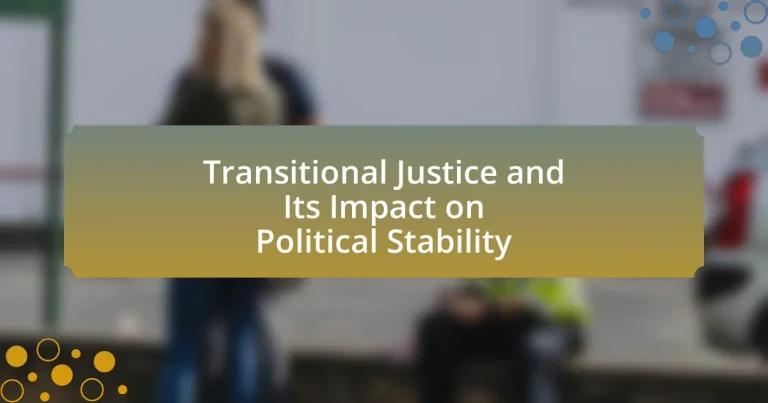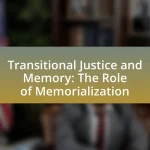Transitional justice encompasses judicial and non-judicial measures aimed at addressing past human rights violations in societies emerging from conflict or authoritarian rule. This article examines the significant role of transitional justice in fostering political stability by promoting accountability, reconciliation, and the rule of law. Key mechanisms such as truth commissions, criminal prosecutions, reparations, and institutional reforms are explored, highlighting their contributions to societal healing and trust in political institutions. The article also discusses the challenges and criticisms faced in implementing these mechanisms, as well as best practices and the importance of stakeholder engagement and international support in enhancing transitional justice outcomes.
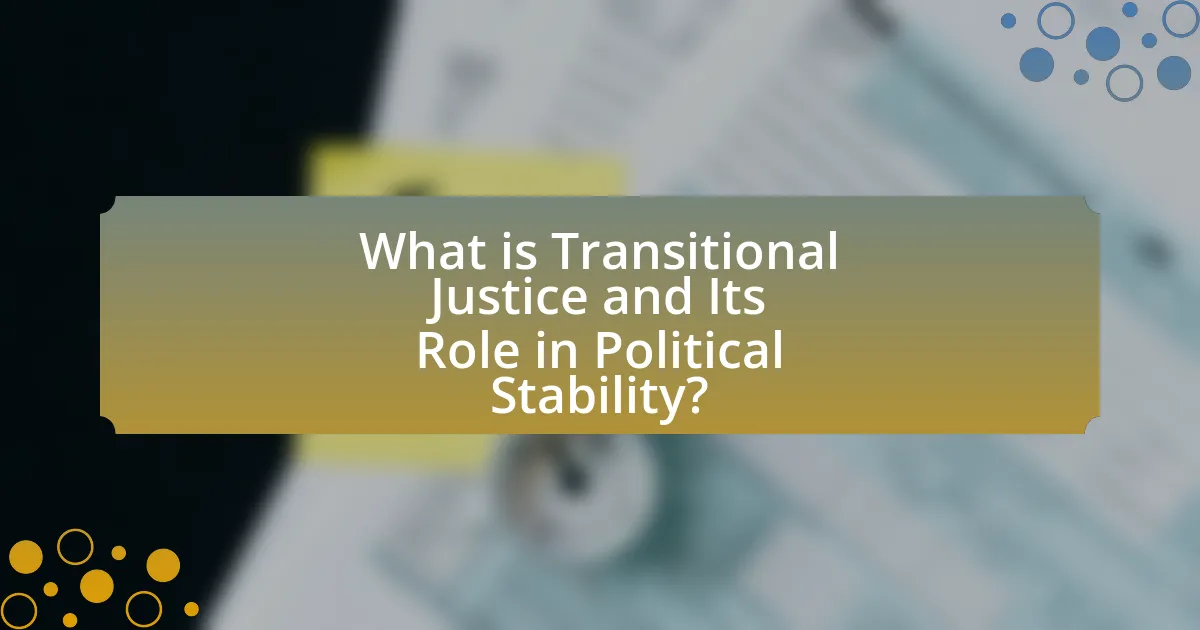
What is Transitional Justice and Its Role in Political Stability?
Transitional justice refers to the set of judicial and non-judicial measures implemented to address past human rights violations and promote accountability, reconciliation, and the rule of law in societies transitioning from conflict or authoritarianism. Its role in political stability is significant, as effective transitional justice mechanisms can foster trust in institutions, reduce the likelihood of renewed violence, and facilitate social cohesion. For instance, countries like South Africa and Rwanda have utilized transitional justice processes, such as truth commissions and trials, to address grievances and promote healing, which has contributed to their political stability post-conflict.
How does Transitional Justice contribute to the healing of societies?
Transitional Justice contributes to the healing of societies by addressing past human rights violations and fostering accountability, truth, and reconciliation. This process helps victims regain dignity and promotes societal trust, which is essential for rebuilding communities. For instance, truth commissions, such as South Africa’s Truth and Reconciliation Commission, have documented atrocities, allowing victims to share their experiences and facilitating national healing. Additionally, legal accountability for perpetrators can deter future violations, reinforcing the rule of law and contributing to long-term political stability.
What are the key mechanisms of Transitional Justice?
The key mechanisms of Transitional Justice include truth commissions, criminal prosecutions, reparations, and institutional reforms. Truth commissions, such as South Africa’s Truth and Reconciliation Commission, aim to uncover the truth about past human rights violations, fostering public acknowledgment and healing. Criminal prosecutions hold perpetrators accountable, as seen in the International Criminal Court’s efforts to prosecute war crimes. Reparations provide compensation to victims, which can help restore dignity and promote societal healing, exemplified by programs in countries like Argentina. Institutional reforms focus on restructuring governmental and legal systems to prevent future abuses, as demonstrated by reforms in post-conflict societies like Rwanda. These mechanisms collectively contribute to political stability by addressing grievances, promoting accountability, and fostering reconciliation.
How do these mechanisms promote accountability and reconciliation?
Transitional justice mechanisms promote accountability and reconciliation by establishing legal frameworks that hold perpetrators of human rights violations accountable for their actions. These mechanisms, such as truth commissions and trials, provide a platform for victims to share their experiences, which fosters acknowledgment of past injustices. For instance, the South African Truth and Reconciliation Commission facilitated public testimonies that not only revealed the extent of apartheid-era abuses but also encouraged national healing by allowing victims and perpetrators to confront the past. This process of public acknowledgment and accountability is crucial for rebuilding trust in institutions and society, ultimately contributing to political stability.
Why is Political Stability important in post-conflict societies?
Political stability is crucial in post-conflict societies because it fosters an environment conducive to rebuilding and reconciliation. Stability allows for the establishment of effective governance, which is essential for implementing transitional justice measures that address past grievances and promote social cohesion. For instance, countries like Rwanda have demonstrated that political stability can lead to significant economic recovery and societal healing after conflict, as seen in their post-genocide reconstruction efforts. Furthermore, research indicates that stable political environments reduce the likelihood of renewed violence, as evidenced by the World Bank’s findings that highlight the correlation between stability and sustainable peace in post-conflict nations.
What factors contribute to political stability after conflict?
Political stability after conflict is primarily influenced by effective transitional justice mechanisms, inclusive governance, and economic recovery. Transitional justice, which includes truth commissions, reparations, and accountability for past atrocities, helps societies address grievances and fosters reconciliation. For instance, the Truth and Reconciliation Commission in South Africa played a crucial role in promoting national unity and healing after apartheid, contributing to long-term stability. Inclusive governance, where diverse groups are represented in political processes, reduces the likelihood of renewed conflict by ensuring that all voices are heard. Additionally, economic recovery, supported by international aid and investment, creates jobs and improves living standards, which can mitigate tensions and foster a stable environment. Collectively, these factors create a foundation for lasting peace and stability in post-conflict societies.
How does Transitional Justice influence these factors?
Transitional Justice influences political stability by promoting accountability, fostering reconciliation, and establishing the rule of law in post-conflict societies. By addressing past human rights violations through mechanisms such as truth commissions and trials, Transitional Justice helps to build trust between the state and its citizens, which is essential for political stability. For instance, the Truth and Reconciliation Commission in South Africa played a crucial role in mitigating tensions after apartheid by allowing victims to share their experiences and perpetrators to confess their crimes, thereby facilitating a peaceful transition. This process not only aids in healing societal wounds but also deters future abuses by reinforcing legal norms and accountability, ultimately contributing to a more stable political environment.
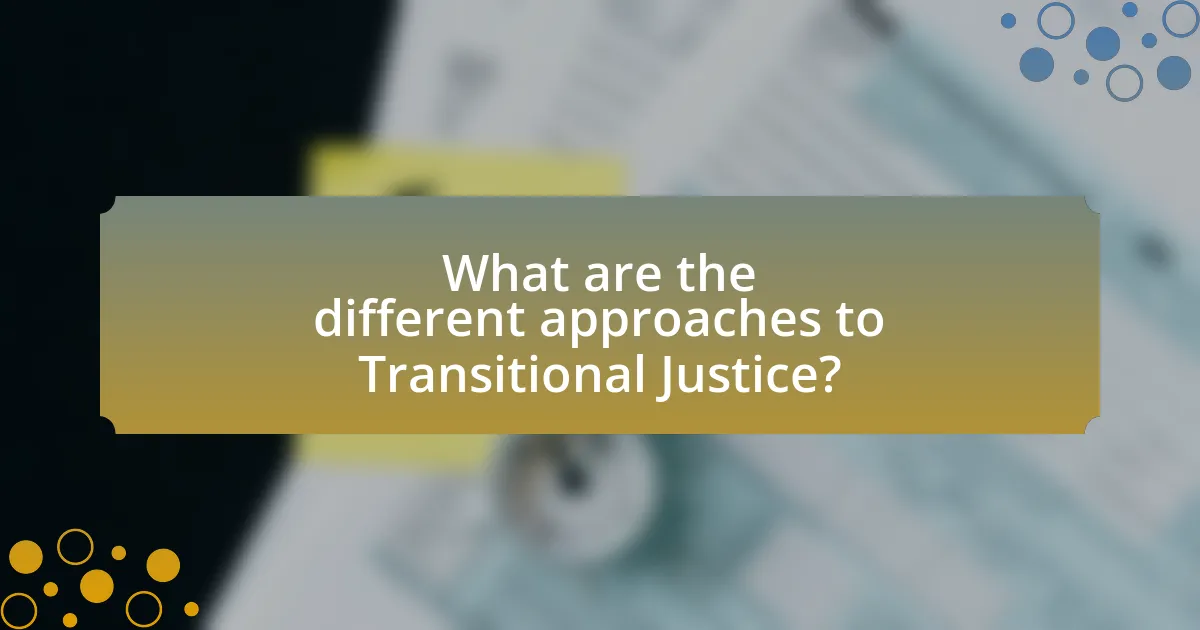
What are the different approaches to Transitional Justice?
The different approaches to Transitional Justice include criminal prosecutions, truth commissions, reparations, institutional reforms, and amnesty laws. Criminal prosecutions aim to hold individuals accountable for human rights violations, as seen in the Nuremberg Trials after World War II. Truth commissions, such as South Africa’s Truth and Reconciliation Commission, seek to uncover the truth about past abuses and promote national healing. Reparations involve compensating victims for their suffering, which can take various forms, including financial payments or community projects. Institutional reforms focus on changing the structures that allowed abuses to occur, often through police and judicial reforms. Lastly, amnesty laws may be enacted to encourage peace by preventing prosecution of certain offenders, although they can be controversial and may hinder accountability. Each approach has its own implications for political stability, as they can either foster reconciliation or perpetuate divisions within society.
What are the main types of Transitional Justice mechanisms?
The main types of Transitional Justice mechanisms include truth commissions, criminal prosecutions, reparations programs, and institutional reforms. Truth commissions, such as the South African Truth and Reconciliation Commission, aim to uncover the truth about past human rights violations and promote national healing. Criminal prosecutions hold individuals accountable for crimes, exemplified by the International Criminal Court’s efforts to prosecute war crimes. Reparations programs provide compensation to victims, as seen in various countries that have implemented financial or symbolic reparations. Institutional reforms focus on restructuring governmental and legal systems to prevent future abuses, which is critical for establishing long-term political stability. These mechanisms collectively contribute to addressing past injustices and fostering a more stable political environment.
How do truth commissions function in promoting justice?
Truth commissions function in promoting justice by uncovering the truth about past human rights violations and fostering accountability. They achieve this through public hearings, testimonies from victims and perpetrators, and the documentation of abuses, which helps to establish a historical record. For instance, the South African Truth and Reconciliation Commission, established in 1995, played a crucial role in addressing apartheid-era crimes, allowing victims to share their experiences and facilitating a national dialogue on reconciliation. This process not only aids in healing societal wounds but also serves as a deterrent against future violations by holding individuals accountable, thereby reinforcing the rule of law and contributing to political stability.
What role do reparations play in the Transitional Justice process?
Reparations play a crucial role in the Transitional Justice process by addressing the harms suffered by victims of human rights violations. They serve to acknowledge the suffering of individuals and communities, promote healing, and restore dignity, which is essential for rebuilding trust in post-conflict societies. Historical examples, such as the reparations provided to victims of apartheid in South Africa, demonstrate that financial compensation, restitution of property, and public acknowledgment can facilitate reconciliation and contribute to political stability by fostering a sense of justice and accountability.
How do different countries implement Transitional Justice?
Different countries implement Transitional Justice through various mechanisms such as truth commissions, reparations programs, and criminal prosecutions. For instance, South Africa established the Truth and Reconciliation Commission to address past human rights violations and promote national healing after apartheid, while Rwanda created Gacaca courts to facilitate community-based justice following the 1994 genocide. Additionally, countries like Argentina have pursued criminal trials against former military leaders for human rights abuses during the Dirty War, demonstrating a legal approach to accountability. These diverse implementations reflect each country’s unique historical context and societal needs, contributing to their political stability by fostering reconciliation and addressing grievances.
What lessons can be learned from successful Transitional Justice cases?
Successful Transitional Justice cases demonstrate the importance of inclusivity and community engagement in the reconciliation process. For instance, the Truth and Reconciliation Commission in South Africa involved diverse stakeholders, which helped to foster national unity and healing after apartheid. This approach not only addressed past injustices but also facilitated dialogue among different societal groups, contributing to long-term political stability. Additionally, successful cases often emphasize the need for accountability and legal reforms, as seen in the post-conflict justice mechanisms in Rwanda, which aimed to hold perpetrators accountable while promoting societal healing. These elements underscore that effective Transitional Justice can lead to sustainable peace and governance by addressing grievances and fostering trust in institutions.
What challenges do countries face in implementing these mechanisms?
Countries face significant challenges in implementing transitional justice mechanisms, primarily due to political resistance, lack of resources, and societal divisions. Political resistance often arises from those in power who fear accountability for past actions, hindering the establishment of necessary legal frameworks. Additionally, many countries lack the financial and institutional resources required to effectively implement these mechanisms, which can lead to inadequate investigations and prosecutions. Societal divisions, stemming from historical grievances and ongoing conflicts, further complicate the process, as different groups may have conflicting views on justice and reconciliation. For instance, in post-apartheid South Africa, the Truth and Reconciliation Commission faced challenges due to deep-seated societal divisions and differing expectations among victims and perpetrators.
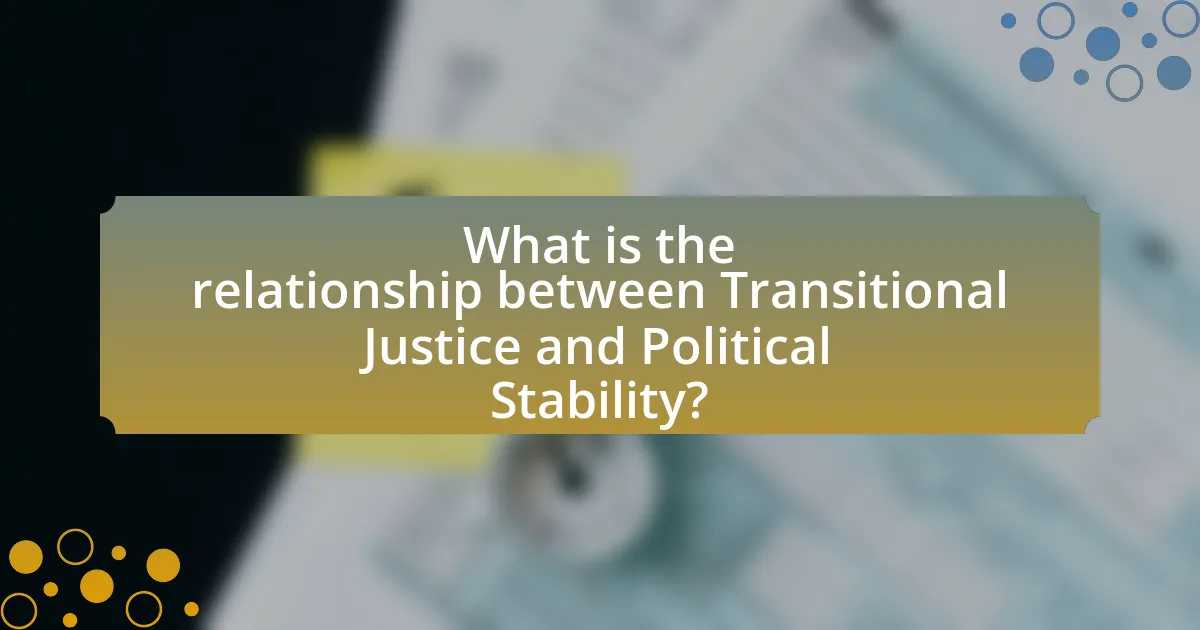
What is the relationship between Transitional Justice and Political Stability?
Transitional Justice directly contributes to Political Stability by addressing past human rights violations and fostering reconciliation. Effective Transitional Justice mechanisms, such as truth commissions and reparations, help societies confront their histories, which can reduce tensions and promote social cohesion. For instance, the Truth and Reconciliation Commission in South Africa played a crucial role in transitioning from apartheid to a stable democracy by allowing victims to share their experiences and facilitating national healing. Studies indicate that countries implementing Transitional Justice measures experience lower levels of political violence and increased trust in institutions, thereby enhancing overall political stability.
How does Transitional Justice impact the legitimacy of political institutions?
Transitional Justice enhances the legitimacy of political institutions by promoting accountability, truth, and reconciliation in post-conflict societies. When political institutions implement transitional justice mechanisms, such as truth commissions or reparations, they signal a commitment to addressing past human rights violations, which fosters public trust. For instance, the Truth and Reconciliation Commission in South Africa, established in the 1990s, played a crucial role in legitimizing the new democratic government by acknowledging the injustices of apartheid and facilitating national healing. This process not only validated the experiences of victims but also reinforced the authority of the political institutions involved, demonstrating their dedication to justice and rule of law.
What evidence exists linking Transitional Justice to improved governance?
Transitional Justice is linked to improved governance through mechanisms that promote accountability, reconciliation, and the rule of law. Evidence shows that countries implementing Transitional Justice measures, such as truth commissions and reparations, experience enhanced political stability and governance. For instance, a study by the International Center for Transitional Justice found that nations like South Africa and Argentina, which adopted Transitional Justice frameworks, demonstrated significant improvements in democratic governance indicators, including increased public trust in institutions and reduced corruption levels. Furthermore, research published in the Journal of Peace Research indicates that societies engaging in Transitional Justice processes are less likely to relapse into conflict, thereby fostering a more stable governance environment.
How can Transitional Justice prevent future conflicts?
Transitional Justice can prevent future conflicts by addressing past grievances and fostering reconciliation among affected communities. By implementing mechanisms such as truth commissions, reparations, and legal accountability for human rights violations, Transitional Justice promotes healing and restores trust in institutions. For instance, the Truth and Reconciliation Commission in South Africa successfully facilitated dialogue and acknowledgment of past atrocities, which contributed to a more stable political environment post-apartheid. This approach reduces the likelihood of revenge-driven violence and helps establish a foundation for sustainable peace, as evidenced by studies showing that societies engaging in Transitional Justice processes experience lower rates of recurrence of conflict.
What are the potential drawbacks of Transitional Justice?
Transitional Justice can lead to several potential drawbacks, including the risk of exacerbating divisions within society. For instance, when certain groups feel marginalized or unfairly treated during the justice process, it can deepen existing societal rifts, as seen in post-apartheid South Africa where some communities felt excluded from the benefits of reconciliation efforts. Additionally, the focus on legal accountability may divert attention from broader socio-economic issues, hindering comprehensive recovery and stability. Research indicates that in countries like Rwanda, prioritizing justice over development can lead to ongoing tensions and dissatisfaction among the populace. Furthermore, the implementation of transitional justice mechanisms can be costly and resource-intensive, potentially straining already limited governmental capacities, as evidenced by the financial burdens faced by countries like Sierra Leone during their post-conflict recovery.
How can Transitional Justice processes lead to political instability?
Transitional Justice processes can lead to political instability by creating divisions among different societal groups. When these processes, such as truth commissions or reparations, are perceived as favoring one group over another, they can exacerbate existing tensions and lead to conflict. For instance, in post-apartheid South Africa, the Truth and Reconciliation Commission aimed to address past injustices but faced criticism for not adequately addressing the needs of all communities, which contributed to ongoing social unrest. Additionally, if the outcomes of Transitional Justice processes are seen as inadequate or unjust, it can lead to disillusionment with political institutions, further destabilizing the political landscape.
What criticisms exist regarding the effectiveness of Transitional Justice?
Criticisms regarding the effectiveness of Transitional Justice include its potential to create a false sense of closure, the risk of selective justice, and the inadequacy of reparations. Critics argue that Transitional Justice mechanisms, such as truth commissions and trials, may not address the root causes of conflict, leading to ongoing grievances. For instance, the South African Truth and Reconciliation Commission has been criticized for failing to deliver justice for victims, as many perpetrators were granted amnesty. Additionally, the focus on individual accountability can overshadow systemic issues, resulting in a lack of comprehensive societal change. Furthermore, reparations often fall short of meeting the needs of affected communities, which can perpetuate feelings of injustice and hinder long-term reconciliation.
What best practices can enhance the effectiveness of Transitional Justice?
Best practices that can enhance the effectiveness of Transitional Justice include ensuring local community involvement, promoting victim-centered approaches, and establishing clear legal frameworks. Local community involvement fosters trust and ownership, as seen in South Africa’s Truth and Reconciliation Commission, which engaged communities in the healing process. Victim-centered approaches prioritize the needs and voices of victims, as demonstrated by the International Criminal Court’s focus on victim participation in proceedings. Clear legal frameworks provide the necessary structure for accountability and justice, evidenced by the establishment of laws in countries like Rwanda that support transitional justice mechanisms. These practices collectively contribute to political stability by addressing grievances and fostering reconciliation.
How can stakeholder engagement improve Transitional Justice outcomes?
Stakeholder engagement can significantly improve Transitional Justice outcomes by fostering inclusivity and ensuring that diverse perspectives are considered in the justice process. Engaging stakeholders, such as victims, community leaders, and civil society organizations, enhances the legitimacy of Transitional Justice mechanisms, as evidenced by the success of truth commissions in South Africa and Sierra Leone, where broad participation led to greater public acceptance and adherence to the outcomes. Furthermore, stakeholder involvement can facilitate dialogue, promote reconciliation, and address the specific needs and grievances of affected communities, ultimately contributing to long-term political stability and social cohesion.
What role does international support play in successful Transitional Justice initiatives?
International support is crucial for the success of Transitional Justice initiatives as it provides essential resources, expertise, and legitimacy. This support often includes financial aid, technical assistance, and the sharing of best practices from other countries that have undergone similar processes. For instance, the International Criminal Court and various United Nations bodies have played significant roles in supporting countries like Rwanda and South Africa in their transitional justice efforts, helping to establish legal frameworks and promote accountability. Furthermore, international backing can enhance the credibility of local initiatives, encouraging broader participation from affected communities and fostering trust in the process. Studies have shown that countries receiving substantial international support for transitional justice are more likely to achieve sustainable peace and political stability, as evidenced by the successful reconciliation processes in post-conflict societies.
